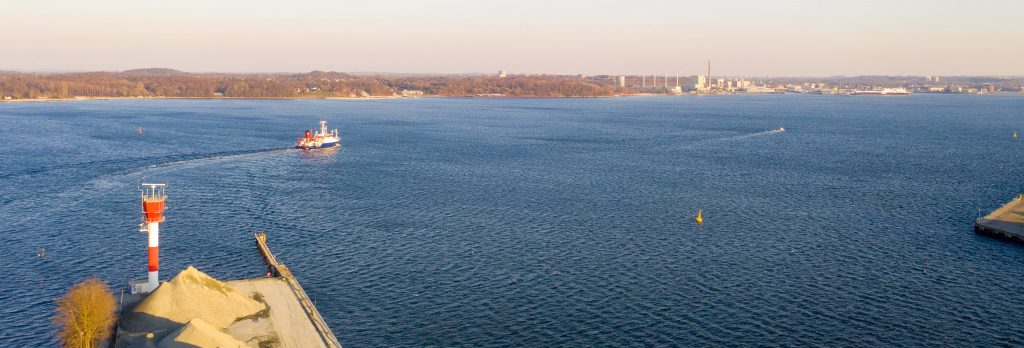(english below)
Auch diese Woche wollen wir darüber informieren, wie es um die Meeresforschung in Zeiten der Pandemie am GEOMAR steht. Hier in Kiel ist alles sehr ruhig. Wer kann, arbeitet im Homeoffice. Auch unsere Forschungsschiffe sind zu Hause. Die Zeit wird nun genutzt, um kleinere Reparaturen und Wartungsarbeiten durchzuführen. Aktuell liegen ALKOR und LITTORINA am Ostufer in direkter Nähe zum Erweiterungsneubau, wo übrigens auch fleißig weiter gearbeitet wird.
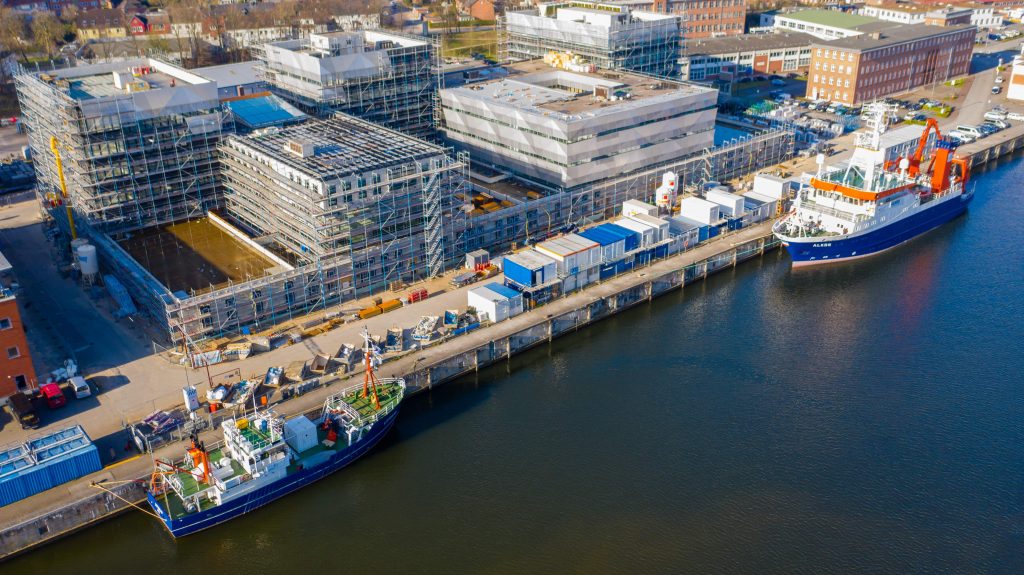
Aber nicht alle Mitarbeiterinnen und Mitarbeiter befinden sich aktuell in Kiel. Das Team an Bord der METEOR konnte die Expedition M162 erfolgreich abschließen und befindet sich jetzt auf dem Transit nach Deutschland, Zielhafen Emden. Am 11. April wird sie dort erwartet. Um den portugiesischen Expeditionsteilnehmern die Heimreise zu erleichtern, legte die METEOR am 5. April einen kurzen Zwischenstopp in Lissabon ein, um dort 7 Fahrtteilnehmer abzusetzen. Hier ein Link zur aktuellen Position der METEOR.
Auch die anderen deutschen Forschungsschiffe befinden sich aktuell in deutschen Häfen oder sind auf dem Rückweg nach Deutschland. Forschungsexpeditionen sind momentan nur noch eingeschränkt möglich. Einen Überblick über die deutschen Forschungsschiffe hat die Deutsche Allianz Meeresforschung (DAM) hier zusammengestellt.
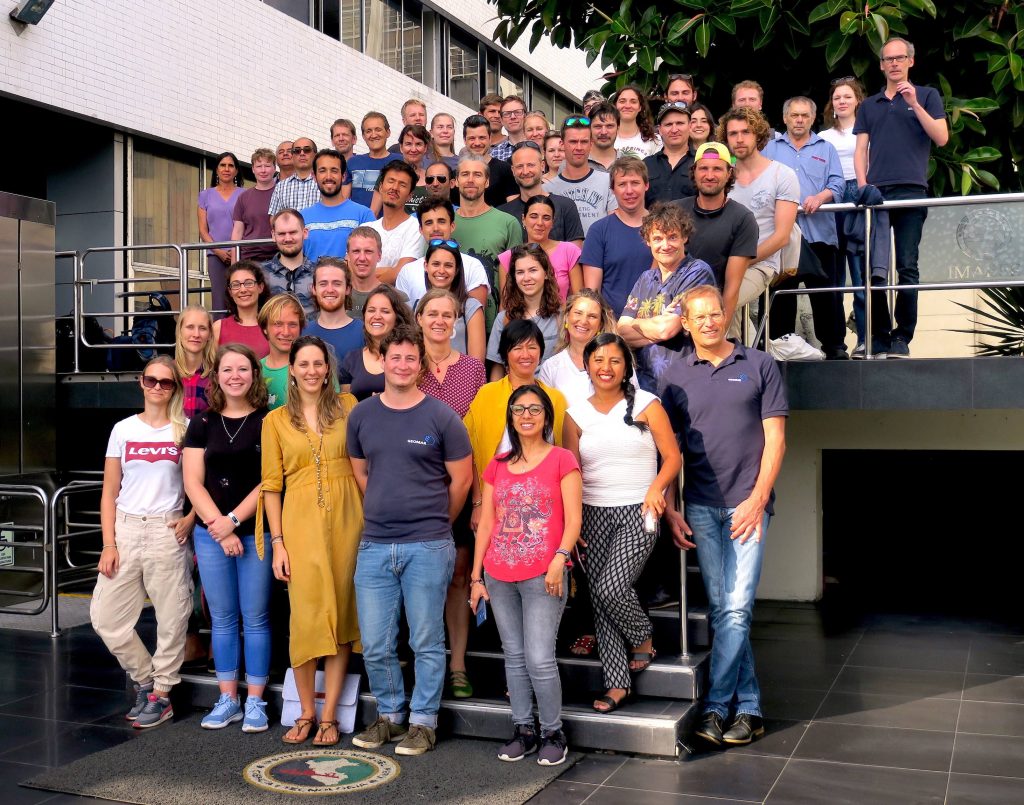
Wir haben letzte Woche auch über die land-basierte Expeditionen CUSCO geschrieben. Mittlerweile gibt gute Neuigkeiten aus Peru. Dort fand zur Zeit ein großes Experiment mit neun KOSMOS-Mesokosmen statt. Im Rahmen des Projects CUSCO untersuchen 50 Forschende, wie sich der Klimawandel auf das biologisch äußerst produktive Auftriebssystem vor der Küste Perus auswirken könnte. Anfang dieser Woche war das Experiment beendet. „Ja, das Experiment haben wir, trotz all der Einschränkungen und Hindernisse, erfolgreich zum Abschluss bringen können. Mit einigen Einbußen im Umfang der Messparameter. Aber alle Kernparameter konnten wir weitgehend abdecken“, so Projektleiter Prof. Ulf Riebesell. Nun ist noch unklar, wie die großen KOSMOS-Mesokosmen geborgen werden können. Das Forschungsschiff Humboldt, dass für das Bergen der Mesokosmen und der Verankerungen zugesagt wurde, ist zurzeit stillgelegt. Das Team hofft auf eine baldige Lockerung der Ausgangssperre. Glücklicherweise konnte etwa die Hälfte der Teilnehmer bereits aus Peru ausgeflogen werden. Möglich gemacht haben das die Rückholprogramme der verschiedenen Teilnehmernationen, denn das Team ist international aufgestellt. Weitere Informationen zum Projekt auf dem CUSCO-Blog.
Wie sieht es eigentlich auf den Kapverden aus? In Mindelo, auf der Insel São Vicente betreibt das GEOMAR, zusammen mit dem Fischereiforschungsinstitut der Kapverden (INDP), das Ocean Science Centre Mindelo (OSCM). Zuerst die gute Nachricht. Die Zeitserienstation CVOO läuft unbeeindruckt von COVID-19 weiter. Anders sieht es hingegen an Land aus. Auch die kapverdischen Inseln sind von COVID-19 betroffen. Der Inselstaat hat vorerst bis zum 17. April den Notstand ausgerufen, die Grenzen sind komplett geschlossen, auch Inlandsflüge und der Fährverkehr sind allein nur noch für die Versorgung mit Gütern oder Krankentransporte im Notfall zugelassen. Dadurch ist so gut wie alles lahmgelegt, die Straßen sind leergefegt, niemand darf mehr zur Arbeit gehen, es sei denn es handelt sich um die Bereiche der medizinischen oder Lebensmittelversorgung. Alle Bürger des Landes müssen in ihren Häusern bleiben. Polizei und Militär patrouillieren die Straßen. Die Maßnahmen sind aufgrund der Vulnerabilität des Gesundheitssystems noch um einiges strikter als zum Beispiel in Deutschland. Bis gestern gab es glücklicherweise nur 6 registrierte positive Fälle. Aber die Wirtschaft leidet immens, die Auswirkungen werden schon jetzt spürbar, 3/4 des Bruttoinlandsprodukts (BIP) werden aus Handel, Transport und öffentlichen Dienstleistungen und Tourismus generiert, Tourismus allein macht 23 Prozent des BIP aus. Viele sind davon abhängig, und großzügige Hilfen von staatlicher Seite sind wohl kaum zu erwarten.
Das OSCM ist natürlich auch vom Notstand betroffen und musste geschlossen werden. Nur der Gebäudetechniker darf mit Genehmigung nach dem Rechten sehen und die Wachen sind vor Ort. Alle Workshops und größeren Kampagnen sind bis auf Weiteres verschoben.
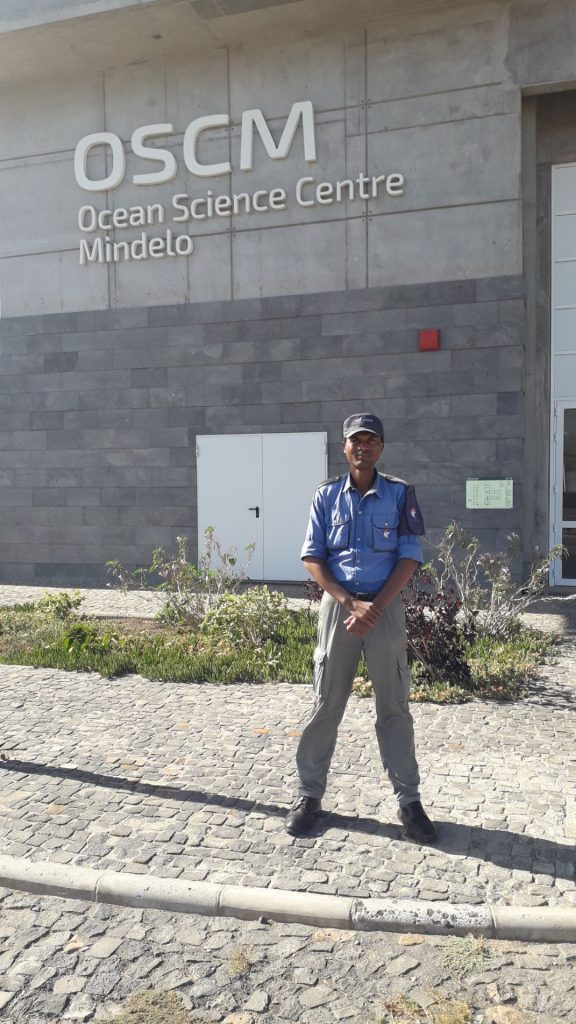
Der Wachdienst ist vor Ort, Foto: Eder Silva 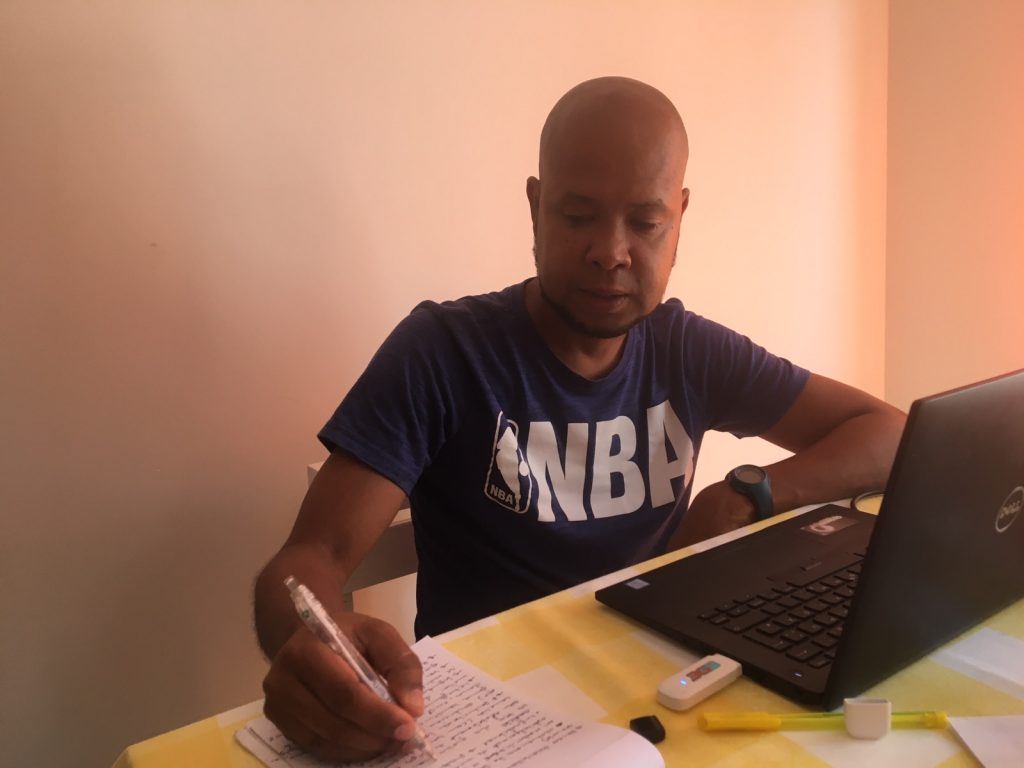
Homeoffice auf den Kapverden, Foto: Ivanice Monteiro 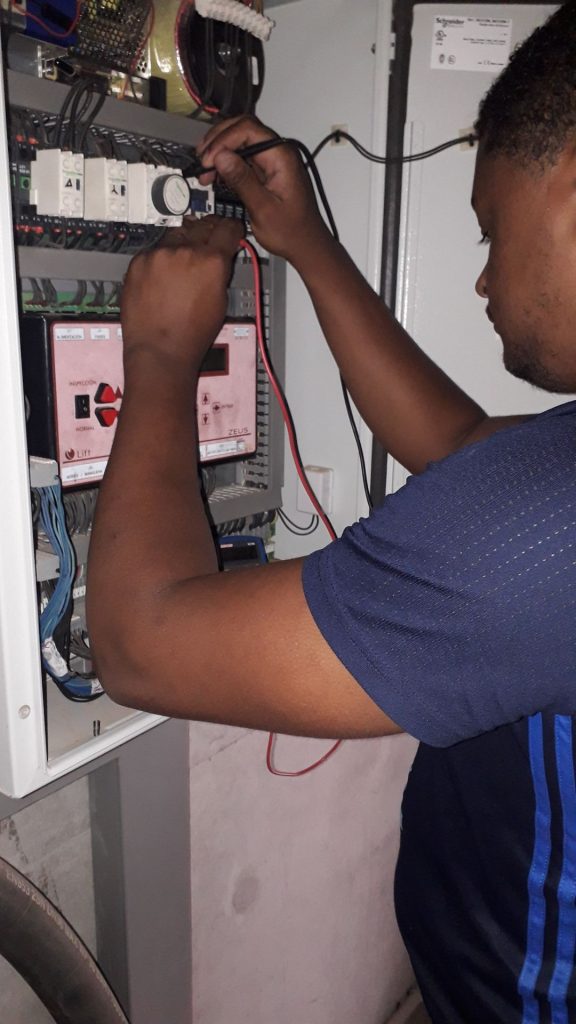
Der Gebäudetechniker im OSCM
Soweit der aktuelle Stand in der Meeresforschung am GEOMAR. Wir halten euch weiterhin auf dem Laufenden. Wenn Ihr Fragen habt, nutzt gern die Kommentarfunktion.
Um euch die Homeoffice Zeit ein wenig zu versüßen, werden wir euch beginnend in dieser Woche das „Tier der Woche“ vorstellen. Dr. Henk-Jan Hoving und das JAGO-Team haben bei ihrer letzten Expedition so viele erstaunliche Tiefseeorganismen entdeckt, dass wir sie einfach mit euch teilen müssen. Schaut also regelmäßig auf unseren Social Media Kanälen vorbei, es lohnt sich!
Bleibt gesund und frohe Ostern!
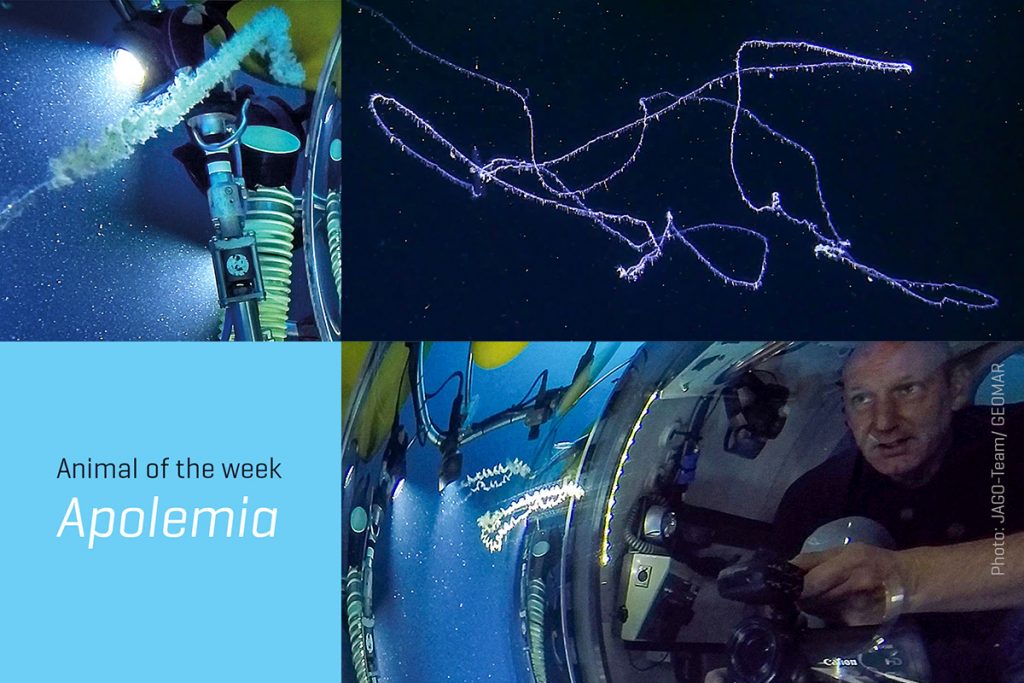
Beobachtet aus dem bemannten Tauchboot JAGO vor den Kapverden. / Animal of the week: Apolemia. This animal looks like a single organism, but each specimen is a colony of specialised organisms. APOLEMIA belongs to the order of siphonophores, colonial cnidarians and is one of the longest animals in the ocean! Observed from manned submersible JAGO off Cape Verde.
English version
Update on marine research in times of pandemic
In this week we also want to share information about the state of marine research at GEOMAR in times of a pandemic. Here in Kiel everything is very quiet. Those who can, work from home. Our research vessels are also situated at home. The time is now used to do small repairs and maintenance work. Currently, ALKOR and LITTORINA are located on the east shore in direct proximity to the new extension building, where, by the way, work is also continuing with great effort.
But not all employees are currently in Kiel.
The team on board the RV METEOR could successfully complete the expedition M162 and is now on its way to Germany, final destination Emden. It is expected there on April 11th. In order to facilitate the journey home for the Portuguese expedition participants, the METEOR made a short stopover in Lisbon on April 5th to drop off 7 participants. Here a link to the current position of the METEOR.
The other German research vessels are also currently in German ports or on their way back to Germany. Research expeditions are currently only possible to a limited extent. The German Marine Research Alliance (DAM) has compiled an overview of German research vessels here.
Last week we also wrote about a land-based expedition. There is good news from Peru. A big experiment with 9 KOSMOS mesocosms is currently taking place in Peru. As part of the CUSCO project, 50 researchers will investigate how climate change is affecting the biologically highly productive upwelling system off the coast of Peru. The experiment ended earlier this week. “Yes, we were able to bring the experiment to a successful ending – despite all the restrictions and difficulties. With some loss of measurement parameters. But we were largely able to cover all the core parameters,” says project leader Prof. Ulf Riebesell. Now it is still unclear how the large KOSMOS mesocosms can be recovered. The research vessel Humboldt, which was promised for the recovery of the mesocosms and the moorings, is currently being taken out of service. The team hopes for an early release of the curfew. Fortunately about half of the participants have already been flown out of Peru. This has been made possible by the repatriation programs of the different nations of the participants, because the team is internationally positioned. Further information about the project on the CUSCO blog.
What is the situation in Cape Verde? In Mindelo, on the island of São Vicente, GEOMAR operates the Ocean Science Centre Mindelo (OSCM) together with the Cape Verde Fisheries Research Institute (INDP). First the good news. The time series station CVOO continues to run unimpressed by COVID-19. The situation is different on land, however. The Cape Verdean islands are also affected by COVID-19. The island state has declared a state of emergency for the time being until April 17th, the borders are completely closed, even domestic flights and ferry traffic are only allowed to supply goods or transport patients in case of emergency. Almost everything is paralyzed, the roads are empty, nobody is allowed to go to work anymore, except for medical or food supply. All citizens of the country must remain in their homes. Police and military are patrolling the streets. Due to the vulnerability of the health system, the measures are even stricter than in Germany, for example. Fortunately, until yesterday there were only 6 registered positive cases. But the economy is suffering immensely, the effects are already being felt, 3/4 of GDP is generated by trade, transport and public services and tourism, tourism alone accounts for 23% of GDP. Many depend on it, and generous government aid is hardly to be expected.
The OSCM is of course also closed. Only the building technician is allowed to check on things with permission and the guards are on site. All workshops and major campaigns are postponed until further notice.
So much for the current state of marine research at GEOMAR. We will keep you informed. If you have questions, please use the comment function.
To sweeten your homeoffice time a little, we will introduce the “Animal of the week” starting this week. Dr Henk-Jan Hoving and the JAGO team discovered so many amazing deep-sea organisms on their last expedition that we simply have to share them with you. So check back regularly on our social media channels, it’s worth it!
Stay healthy and happy Easter!
